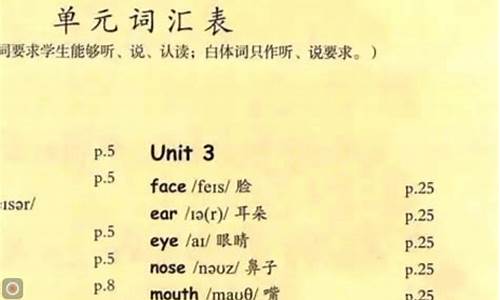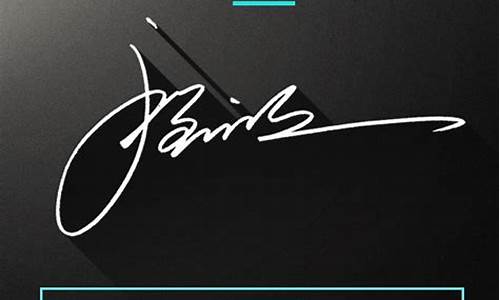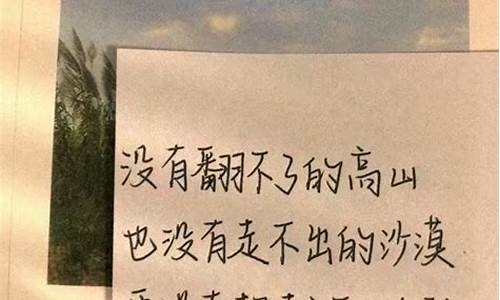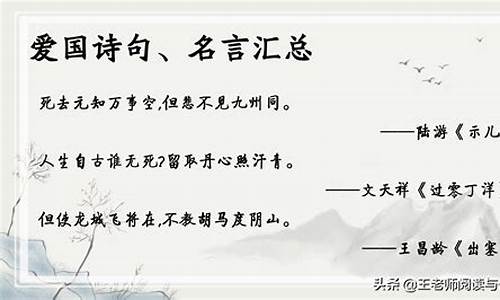您现在的位置是: 首页 > 幸福的句子 幸福的句子
人教版英语三年级上册句子_人教版英语三年级上册句子跟读
tamoadmin 2024-09-16 人已围观
简介1.怎么读英语三年级上册2.小学三年级英语日记6个句子3.三年级英语第四单元重点句子三年级上册英语74页句子这样子写本子上方法如下。1、英语本子的格子为四线三格(即一行),大小写字母左右均匀书写,看清楚每个字母是如何占据格子的,字书写过程中注意大小写字母的格式和书写是不同的,也要注意上下对齐。2、大写字母全部占上两个格,(如果是横线,就是横线上面)。小写字母一般占中间一格。怎么读英语三年级上册PE
1.怎么读英语三年级上册
2.小学三年级英语日记6个句子
3.三年级英语第四单元重点句子

三年级上册英语74页句子这样子写本子上方法如下。
1、英语本子的格子为四线三格(即一行),大小写字母左右均匀书写,看清楚每个字母是如何占据格子的,字书写过程中注意大小写字母的格式和书写是不同的,也要注意上下对齐。
2、大写字母全部占上两个格,(如果是横线,就是横线上面)。小写字母一般占中间一格。
怎么读英语三年级上册
PEP英语三年级(上册)四会单词
Unit 1:pen (钢笔) pencil (铅笔) pencil-case ( 铅笔盒) ruler(尺)
eraser(橡皮)crayon(蜡笔)book (书)bag (书包)sharpener (卷笔刀)school (学校)
Unit 2:head (头) face( 脸) nose (鼻子)mouth (嘴) eye (眼睛) ear (耳朵) arm (胳膊) finger (手指) leg (腿) foot (脚) body (身体)
Unit 3:red (红色的) yellow (**的) green (绿色的) blue (蓝色的) purple (紫色的)white (白色的)black (黑色的)orange (橙色的)pink (粉色的) brown (棕色的)
Unit 4:cat (猫) dog (狗) monkey (猴子) panda (熊猫) rabbit( 兔子)duck (鸭子) pig (猪) bird (鸟)bear (熊) elephant (大象) mouse (老鼠) squirrel (松鼠)
Unit 5:cake (蛋糕) bread (面包) hot dog (热狗) hamburger (汉堡包) chicken (鸡肉) French fries (榨薯条) Coke (可乐) juice (果汁) milk (牛奶) water (水) tea (茶) coffee (咖啡)
Unit 6:one (一) two (二) three (三) four (四) five (五) six( 六) seven (七) eight (八) nine( 九)ten( 十) doll (玩具娃娃) boat (小船) ball (球)kite (风筝) balloon (气球) car (小汽车) plane (飞机)
PEP英语三年级(下册)四会单词
Unit 1:boy (男孩) girl (女孩)teacher (教师)student (学生)this (这个)my (我的)friend (朋友)I’m=I am (我是)nice (好的;愉快的)good morning (早上好)good afternoon(下午好)meet (遇见;碰见)goodbye (再见)too (也;太)
Unit 2:father (父亲爸爸)dad (爸爸)(口语)mother (母亲;妈妈)mom 妈妈(口语)man (男人)woman(女人)grandmother (外)祖母grandma (口语)(外)祖母grandfather(外)祖父grandpa (口语)(外)祖父sister (姐妹)brother(兄妹)let’s=let us (让我们)great (太好了)really (真地;确切地)and (和;并且)how (多么;怎么样)
Unit 3:eleven (十一)twelve( 十二)thir (十三)four (十四)fif(十五)six (十六)seven (十七)eigh (十八)nine (十九)twenty (二十)how many (多少) can (能够;可以)look at (看;瞧)
Unit 4:peach (桃)pear (梨)orange (橙子)watermelon (西瓜)le (苹果)banana (香蕉)strawberry (草莓)grape (葡萄)like (喜欢)some (一些;某些)thanks (多谢)
Unit 5:bus (公共汽车)bike (自行车)taxi (出租车)jeep (吉普车)desk( 课桌)chair (椅子) walkman (随身听)lamp (台灯) your (你的;你们的)
Unit 6:small (小的)big (大的)long (长的)short (短的;矮的)tall (高的)giraffe (长颈鹿)deer (鹿)
句子找不到了,不好意思,只能找到那么多了!
这是小学所有的句型,我也不知道是几年级的,先给你再说吧!
一、一般疑问句:
1、Did you read books? 你读书了吗?Yes, I did.是的,我读过了。No, I didn’t. 不,我没有读过。
2、Is she quiet? 她文静吗?No, she isn’t. She’s very active. 不,她不。她很活跃。
Is she strict? 她严格吗?Yes, she is, but she’s very kind.是的,她是,但是她很和蔼。
3、Is this a teacher’s desk? 这是一张讲台桌吗?Is it cold? 冷吗?Is her birthday in June?
她的生日在六月吗?Is this your T-shirt? 这是你的T恤衫吗?Yes, it is. 是的。
No, it isn’t. / No, it’s not. 不,不是的。
4、 Can you make the bed? 你会铺床吗?Can you use a computer? 你会使用电脑吗?
Yes, I can. 是的,我会。 No, I can’t. 不,我不会。
5、Are they ducks? 它们是鸭子吗? Are they eating the honey? 它们吃蜂蜜吗?
Yes, they are. 是的,它们是。 No, they aren’t. 不,它们不是。
6、Is there a forest in the park? 公园里有一个森林吗? Is there a river? 那里有条河吗?
Yes, there is. 是的,那里有。 No, there aren’t. 不,那里没有。
7、Are there any pandas in the mountains? 山里有一些熊猫吗?Are there any fish in the
rivers? 河里有一些鱼吗?Yes, there are. 是的,那里有。 No, there aren’t. 不,那里没有。
8、Are you eating lunch? 你(们)正在吃午餐吗? Yes, I am. / Yes, we are. 是的,我正在吃。/
是的,我们正在吃。No, I am not. / No, we aren’t. 不,我没有在吃。/ 不,我们没有在吃。
9、Is he playing chess? 他正在下棋吗? Yes, he is. 是的,他是。 No, he isn’t. 不,他没有。
10、Is she counting insects?她正在数昆虫吗?Yes, she is. 是的,她是。No, she isn’t.不,她没有。
11、Does she/he teach English? 她(他)教英语吗? Yes, she/he does. 是的,她(他)是。
No, she/he doesn’t. 不,她(他)不是。
二、谈论时间:
What time is it? 几点钟?It’s two o’clock. 两点钟。It’s 9:45. It’s time for math class.
九点四十五。是上数学课的时间了。What day is it today? 今天星期几?It’s Wednesday. 星期三。
When do you eat dinner? 你几点吃晚餐?I eat dinner at 7:00 in the evening.
我晚上7点钟吃晚餐。When do you get up? 你几点起床?I usually get up at 12:00 noon. 我一般中午12点钟起床。
When is your birthday? 你的生日是什么时候?It’s in May. 在五月。 My birthday is in June.
我的生日在六月。 Uncle Bill’s birthday is in June, too. 比尔叔叔的生日也在六月。 What’s the date?
June 9th. 几月几日? 六月九日。
三、谈论颜色:
What colour is it? 什么颜色? It’s white. 白色。
四、谈论地点:
Where are you going this afternoon? 下午你打算去哪? I’m going to the bookstore.
我打算去书店。 Where did you go on your holiday? 期你去了哪? I went to Xinjiang. 我去了新疆。
Where does she work? 她在哪工作? She works in a hospital. 她在医院工作。
Where does the rain come from? 雨从哪来? It comes from the clouds. 它从云里来。
Where is the cinema, please? 请问**院在哪? It’s next to the hospital. 在医院旁边。
Turn left at the cinema, then go straight. It’s on the left. 在**那左转,然后直走。它在你的左边。
There are two bedrooms, a kitchen, a bathroom and a living room.
那有两个卧室,一个厨房,一个卫生间和一个客厅。 There is a mirror, a bed and a big closet.
那有一面镜子,一张床和一个大衣柜。 The closet is near the table. 衣柜在桌子的附近。 Many clothes are in
the closet. 很多的衣服在衣柜里。 The trash bin is behind the door. 垃圾桶在门后。
五、谈论价格:
How much is it? 这个多少钱? It’s ten yuan. 十元。 How much are they? 它们多少钱?
They’re three yuan. 它们三元。
六、谈论数量:
How many horses are there? Twelve. 那有多少匹马? 十二匹。
七、谈论人物:
Who’s your English teacher? 你的英语老师是谁? Mr Carter. 卡特先生。
What’s he like? 他长什么样? He’s tall and strong. 他又高又强壮。How old are you? 你几岁?
八、谈论喜好:
What’s your fourite fruit? 你最喜欢的水果是什么? I like les. They’re sweet.
我喜欢苹果。它们很甜。 I like fruit. But I don’t like grapes. They’re sour.
我喜欢水果。但我不喜欢葡萄。它们很酸。 Which season do you like best? 你最喜欢哪个季节? I like winter
best. 我最喜欢冬天。 Summer is good, but fall is my fourite season.
夏天很好,但秋天是我最喜欢的季节。 Why do you like summer? 你为什么喜欢夏天? Because I can swim in the
lake. 因为我可以在湖里游泳。 Why do you like winter? 你为什么喜欢冬天? Because I can sleep a long
time. 因为我可以睡很长的时间。 What’s your hobby? 你的爱好是什么?
I like collecting stamps. 我喜欢收集邮票。 He likes collecting stamps, too. 他也喜欢收集邮票。
九、谈论事情:
This is my computer. 这是我的电脑。 That is your computer. 那是你的电脑。 Let’s play
football. 让我们踢足球吧。 This is Zhang Peng. 这是张鹏。 What did you do last weekend?
你上个周末做了什么?
I played football. 我踢了足球。 What are you going to buy? 你打算去买什么?
I am going to buy a comic book. 我打算去买一本书。 What are you going to do on the
weekend? 周末你打算去做什么? I’m going to visit my grandparents this weekend.
这个周末我打算去拜访我的祖父母。What are they doing? 他们在做什么?They’re swimming. 他们在游泳。They are
climbing trees. 他们在爬树。 What is it doing? 它在做什么?It’s eating bananas.它正在吃香蕉What
is she doing? 她在做什么?She’s jumping.她在跳。What are you doing? 你正在做什么? I’m doing the
dishes. 我正在洗碗。 I’m reading a book. 我正在读书。 Grandpa is writing a letter. 爷爷正在写信。
Brother is doing homework. 兄弟正在做作业。Mom is cooking dinner in the kitchen.
妈妈正厨房里烧饭。 He’s writing an e-mail in the study. 他正在书房里写一封电子邮件。 What do you do on
the weekend? 你周末做什么?Usually I watch TV and go shopping. 一般我看电视和去购物。 Sometimes I
visit my grandparents. 有时候我去拜访我的祖父母。I often play football. 我经常去踢足球。Sometimes I
go hiking. 有时候我去远足。
What do you he on Thursdays? 星期四你们有什么课? We he English, math and science on
Thursdays. 星期四我们有英语,数学和科学课。What do you do on Saturdays? 星期六你做什么?I watch TV on
Saturdays. 星期六我看电视。 What about you? 你呢?I do my homework, too. 我也做我的家庭作业。What do
you he for lunch on Mondays? 星期一你中餐吃什么?We he tomatoes, tofu and fish.
我们吃西红柿,豆腐和鱼。 What can you do? 你能做什么?I can sweep the floor. 我会扫地。 I can cook the
meals. 我会做饭。 I can water the flowers. 我会浇花。
十、谈论方式:
How do you go to school, Sarah? 萨拉,你怎么去学校? Usually I go to school on foot.
一般我走路去学校。 Sometimes I go by bike. 有时候我骑自行车。 How can I get to Zhongshan Park?
我怎么去中山公园? You can go by the No. 15 bus. 你可以坐15路公共汽车。 How did you go there?
你怎么去那? I went by train. 我坐火车去。 How do you do that? First, I …. Then I ….
你怎么做那件事? 首先,我。。。然后我。。。 What should you do then? 然后你怎么做?
How does she go to work? 她怎么去工作? She goes to work by bus. 她坐公共汽车去工作。
十一、谈论心情,身体状况:
How are you, Liu Yun? 刘云,你怎么样? You look so hy. 你看起来很开心。
How are you, Sarah? 萨拉,你怎么样? You look sad today. 今天你看起来很伤心。
What’s the matter? 怎么了? My throat is sore. My nose hurts. 我的喉咙痛。我的鼻子痛。
十二、谈论体重、身高:
How hey are you? 你多少重? I’m 48 kg. 我48公斤。 I’m thinner than you, and shorter.
我比你瘦和矮。 How tall are you? 你多高? I’m 164 cm tall. 我164厘米高。 You’re shorter than me.
你比我矮。 You’re 4 cm taller than me. 你比我高四厘米。
十三、谈论职业:
What does your mother do? 你妈妈做什么的? She is a TV reporter. 她是一个电视台记者。
十四、谈论天气:
It’s warm today. 今天很暖和。 It’s cool. 今天很凉爽。
这些都不要,直接看这个:
://.pep.cn/xe/jszx/tbjxzy/pepxe/pepsa/dzkb/200703/t20070308_302734.htm一页页翻下去吧!
小学三年级英语日记6个句子
英语三年级上册怎么读如下:
三年级上册的英语是孩子们第一次上英语课,常见课本的内容分别是Uint 1 Hello!、Unit 2 Colours!、、Unit 3 Look at me!Recycle 1、Unit 4 we love animals、Unit 5 Let's eat !Unit 6 Hy birthday!Recucle 2words in esch unitvocabulary、Useful expressions。
三年级语文的学习以听、说为主,笔试部分占试卷总分比重较小。因此,三年级学生一定要注重听力方面的培养。在平时的考试中我们发现,三年级英语考试的听力部分占了70分,笔试部分只有30分,可见听力的重要性。
要能听懂,就要掌握本学期所学的内容,单词、短语、句子等都需要能听、读、写,这样才能在考试中灵活运用。三年级上册英语知识点汇总将每个单元的单词、短语、问答句及其中文意思、字母发音等都汇总到一起,大家只需将这些知识点掌握好,考试拿高分基本没什么问题。
三年级英语第四单元重点句子
Today, it is a fine day ! I took my schoolbag and went to school hily. On my way to school I saw a poor blind man was going to cross the road ,so I came up him and helped him to cross the road .After that ,he spoak highly of me by saying I was a good girl. To my surprise,my neighbor knew this and told it to my parents,they all prouded of me . How a nice day !!
三年级英语第四单元重点句子如下:
1.Welcome to my home.欢迎来我家。
2.This is my house.lt's big.这是我的房子,它很大。
3.Where are the keys? They are in the door.钥匙在哪里?在门上。
4.Are they near the table? Yes,they are./No,they arent.他们在桌子附近吗?是的/不是。
5.ls it on the shelf? Yes,it is/No,it isn't.在架子上吗?是的/不在。
扩展知识:
重点句子通常指的是在文章或讲话中具有重要意义的句子。这些句子可能包含关键信息、观点、论据或总结,也可能是对全文或段落起到概括、总结或承上启下作用的句子。重点句子是文本中那些包含核心信息、关键观点、重要论据或总结性陈述的句子。
它们通常具有高度的概括性和浓缩的信息量,能够直接或间接地表达作者的思想和意图。在阅读、写作、演讲或听力理解中,识别和理解重点句子对于准确把握文本的主旨、理解作者的意图和逻辑、提高语言理解和表达能力至关重要。首先,重点句子在文本中起到统领全文或段落的作用。
它们可能是文章的开篇句或结尾句,概括性地表述了文章的主题、目的或主要观点。这些句子为读者提供了理解全文的基础框架,有助于读者在阅读过程中保持对文章内容的连贯理解。同时,重点句子也常常包含关键词或术语,对于准确理解文本的关键信息具有决定性作用。其次。
重点句子在文本中起到承上启下的作用。它们可能出现在段落中间,既对前面的内容进行了总结,又为后面的内容提供了铺垫。承上启下的重点句子帮助读者理解文本的逻辑关系和论述的连贯性,使读者能够更好地理解作者的思路和论证过程。重点句子也常常是作者用来支持其观点的论据或证据。
这些句子中可能包含了事实、数据、例证或其他形式的证据,用以支持作者的观点或反驳对方的论点。对于读者来说,识别和理解这些重点句子有助于他们评估作者的观点和论证的有效性,从而形成更为客观和全面的认识。
在语言层面上,重点句子通常具有较为复杂的句式和较高的信息密度。它们可能包含多个从句、复合句或长句,而且常常使用特定的词汇和表达方式来传达重要的信息。理解和分析重点句子需要较高的语言能力和阅读技巧。
这对于提高学生的阅读理解能力和写作水平具有重要意义。综上所述,“重点句子”是文本中具有重要意义的句子,对于准确理解和把握文本的主旨、逻辑和信息至关重要。









